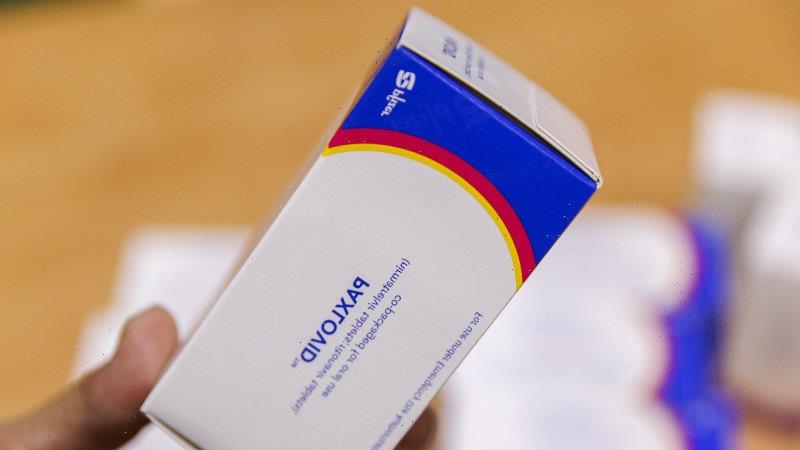Doctors, pharmacists call for better support to prescribe antivirals
Pandemic measures including home delivery of medicines and subsidised Telehealth appointments should be reinstated to allow easier access to antivirals, doctors and pharmacists say, with an older cohort of people catching COVID-19 in the latest wave.
Pharmaceutical Society of Australia president Dr Fei Sim said people ill with COVID-19 were now attending pharmacies to fill scripts for their medicine, including prescribed antivirals, after the COVID-19 Home Medicines Service ended on June 30.
Paxlovid has been listed on the PBS for at-risk groups.Credit:Bloomberg
The service was a federal government initiative that covered home delivery of medicines to people who were in isolation or vulnerable.
“These people understand the importance of getting antivirals early, but if they don’t have family and friends who can pick it up for them, the only thing they can do is walk into a pharmacy,” Sim said.
People with COVID-19 are allowed to leave the home to access healthcare. However, Sim said bringing the virus into pharmacies was not ideal and the reason for the delivery program had not gone away.
“Every healthcare workforce is very stretched at the moment, people are getting sick,” she said.
The Australian Medical Association (AMA) wrote to federal Health Minister Mark Butler on Thursday, calling for him to restore Telehealth to its pandemic settings, after another July 1 change saw Medicare-covered phone consultations between doctors and patients restricted to calls of 20 minutes or less.
AMA vice president Dr Chris Moy said reverting away from funding pandemic-time care indicated the “government does not know what is happening in the real world”.
There are two oral antivirals on the PBS: Paxlovid and Lagevrio. Paxlovid is significantly more effective, but has several interactions with other medications, meaning that, to qualify for antiviral access, people with the health conditions may need to plan changes to their usual medications to receive it.
“When you are prescribing an antiviral, an easy consult is 30 minutes,” Moy said.
Are you eligible for an oral COVID-19 antiviral?
People who test positive to COVID-19 may be eligible to be prescribed an oral antiviral treatment within five days of symptom onset if they are:
- Aged 65+ with two risk factors for severe disease
- Aged 75+ with one risk factor for severe disease
- Aboriginal or Torres Strait Islander, aged 50+ with two risk factors for severe disease
Risk factors for developing severe COVID-19 include neurological conditions like stroke or dementia, chronic respiratory conditions, obesity, diabetes, congestive heart failure, kidney failure, cirrhosis, living in aged or disability care, living in a remote area with reduced access to higher level health care and not having received two doses of a coronavirus vaccine.
People aged 18 and over may also be eligible for antiviral treatments if they are moderately to severely immunocompromised. This includes if they have blood cancer, HIV immunodeficiency, have recently undergone chemotherapy or immunosuppressive treatments, are a transplant recipient, have cerebral palsy or down syndrome, or live in residential care.
The Adelaide GP added that, while patients could have longer video consultations covered by Medicare, this was unhelpful, given the older age profile of people who need to access the drugs.
Asked in a radio interview on Wednesday about the change to Telehealth, Butler said he had received advice that longer consultations should be held on video calls and GPs had been given many months’ notice about the change by the previous government. His office referred further questions to the Department of Health.
In a statement, the department said the service was “designed to assist in safely delivering medicines to people before the population was vaccinated and when many were in isolation or lockdown”, noting many pharmacies offered free delivery, and PBS medicines could be collected by friends and family for people in isolation.
Indications are that the age structure of the BA.4 and BA.5 wave is older than earlier Omicron surges, which were largely driven by infections among children and young adults. In NSW, cases in people aged 40 to 59 are double those in under 19s, and a higher proportion of infections are being reported in over 60s than during summer.
Despite this, antiviral prescriptions have been low. Nationally, about 73,000 people had been prescribed an oral antiviral this year by July 3, only 10,000 of whom received Paxlovid.
Dr Charlotte Hespe, NSW and ACT chair of the Royal Australian College of GPs, said people who believe they are eligible for an antiviral should make an appointment with their doctor now to plan how they can receive the drugs if they test positive.
Because the drugs are listed on the Pharmaceutical Benefits Scheme, a GP will not be able to prescribe an antiviral until the person has the virus.
“If you then get COVID, as soon as you get a positive RAT or a positive PCR, call the doctor and, if you can’t talk to them, leave a phone message to say you have tested positive and you need a prescription,” Hespe said.
A positive RAT result entered into a state government reporting app is sufficient evidence for a GP to prescribe an antiviral, although PCRs are recommended as the drugs can only be prescribed within five days of symptom onset and RATs may return negative results for several days before a positive.
Many doctors will have already queued up the script, ready to be generated when their patient tests positive, Hespe said. An electronic script can be sent to a pharmacy for collection.
“The main message with antivirals is we want you to be quick,” Hespe said. “They have to be given within five days but they are getting less and less effective as you get closer to day five.”
The Morning Edition newsletter is our guide to the day’s most important and interesting stories, analysis and insights. Sign up here.
Most Viewed in National
From our partners
Source: Read Full Article


